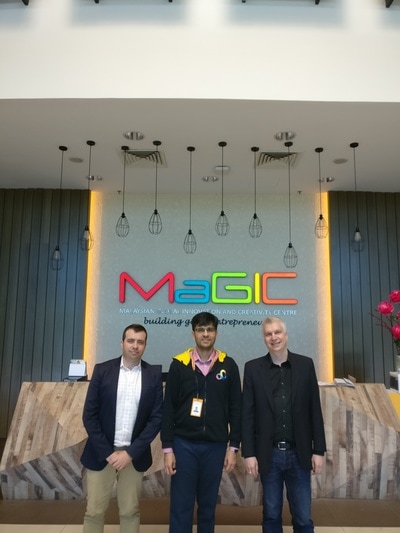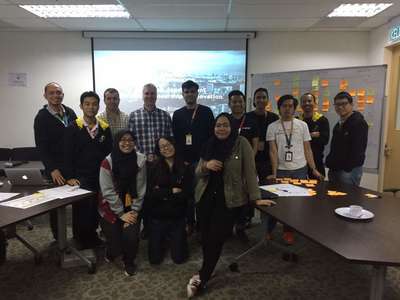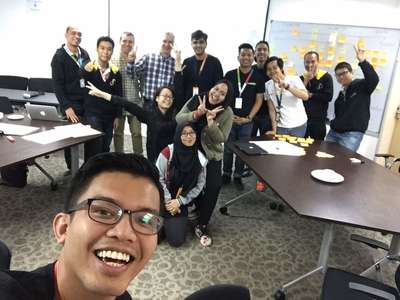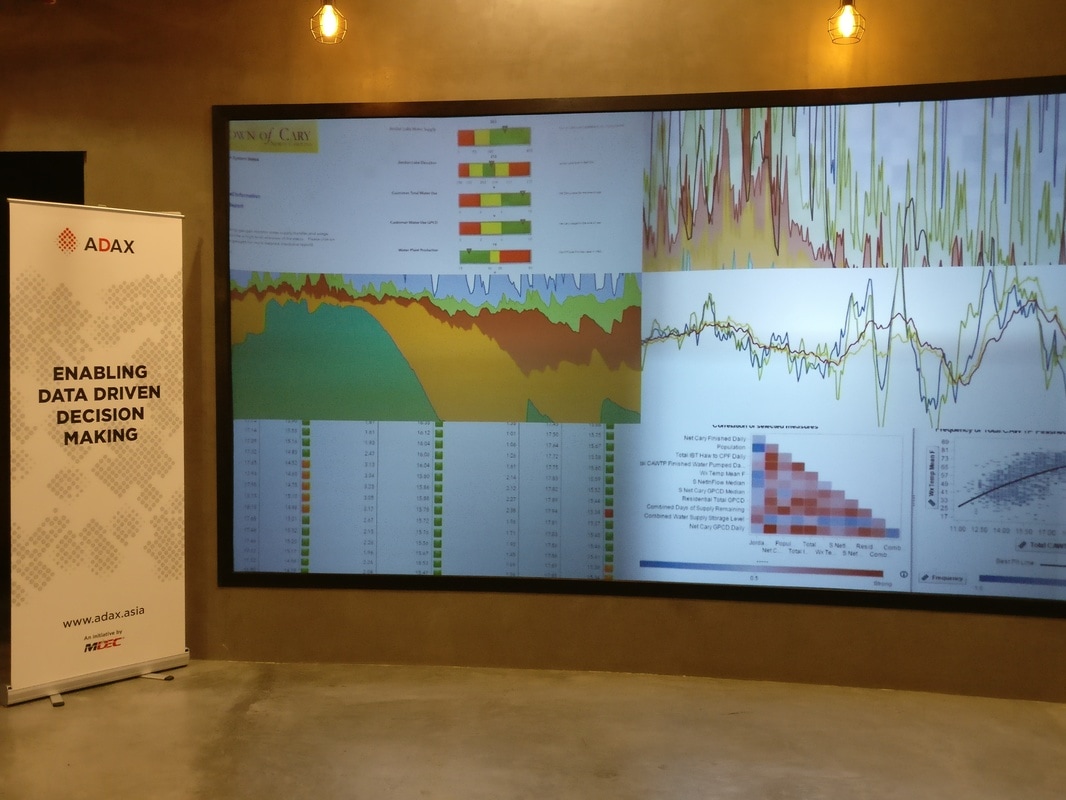|
In recent years, the Government of Malaysia has been taking proactive steps to build a strong infrastructure for the Malaysian entrepreneurship scene. The development of a strong and sustainable startup ecosystem is considered to be a key economic driver for the nation to remain competitive in the global landscape. MaGIC (Malaysian Global Innovation and Creativity Centre) was launched on the 27th of April 2014 by President Barack Obama and Prime Minister YAB Dato’ Sri Mohd Najib Tun Abdul Razak. Since the birth of MaGIC, there has been a significant number of entrepreneurs benefiting from the programs and initiatives offered by the Centre. Startup Commons was invited to host a workshop at MaGIC on building digitally connected and data-driven startup ecosystem. The workshop supported the mission to catalyze the entrepreneurial ecosystem in Malaysia by introducing key stakeholders of ecosystem development to the framework targeting various activities and measuring the impact of these activities, and also providing better understanding of the relations between different areas. "The workshop participants found useful insights on the architecture of startup ecosystem around the world, that will be useful when building similar ecosystem for Malaysia. On the other note, participants learned on designing program and platform that is data and KPI driven, allowing us to achieve result with higher effectiveness." MaGIC The workshop generated great interest from the participants. We at Startup Commons hope that tools provided and skills learnt at the event will contribute to strengthening the entrepreneurship community. With a view to build a sustainable long-term partnership, Startup Commons top-level people met with several organisations in Malaysia to get a better understanding of local startup ecosystem, its challenges and opportunities. These are major stakeholders in building robust startup ecosystem:
Conclusions Malaysia is definitely placing great importance on the development of its digital economy as it will be a key pillar of its current and future economic growth and MDEC, has taken the mandate to look at the Digital Economy of Malaysia in a more holistic manner, involving also other agencies that are playing a relevant role. Many of these agencies have the mandate to become more self sustainable, having already initiated a transition to reduce public funding dependency towards self sustaining agency operations. This direction requires “business-minded” people leading and operating these agencies and therefore, even more special focus on measurement-driven, efficiency and results as the only way to improve. In the context of startup ecosystem, different agencies agree on the need to bring more networking, collaboration and connectivity amongst them and while offline activities already "get it", - digital is no different and it should reflect that: interactions, service processes, service development, ecosystem management, etc. Therefore, there’s initial common vision and good starting point to explore a digital approach aimed to bring more digital connectivity to all parties involved so that information can flow horizontally to reach other organisations, as well as measurability and scalability to make life easier to all actors for best navigation within the startup ecosystem. Startup Commons team has been invited to build a piloting project proposal, with main objective to initiate data and KPI’s -driven approach by data collection and metrics implementation in order to become more efficient in end-to-end perspective (user, operative and decision making level). The piloting project itself will be a big opportunity for Malaysian agencies to understand this digital startup ecosystem infrastructure that will bring more synergies to boost productivity, competitiveness, and resilience. This is originally posted by Startup Commons Team. You are free to re-edit and repost this in your own blog or other use under Creative Commons Attribution 3.0 License terms, by giving credit with a link to www.startupcommons.org and the original post
A startup ecosystem is an immense source of data: just think for a while all type of possible interactions amongst the different players. Every entrepreneur, team member, mentor, investor, service provider, community, startup event, pitching competition, incubator, accelerator, platform, even our favourite place to grab a coffee with our team generates impactful data: numbers, words, tags, audio, videos, photos, geocodes, etc. Everything in real time. Most advanced startup ecosystems in the world with their governments at the forefront have begun to become aware of such vast of data as a high value asset for overall goals of efficient government, public safety, but also to change how government operates for the benefit of all and in the context of startup ecosystems, how it can be used to generate more effective policies to serve startups in the most effective ways possible to facilitate innovative companies development, bring more economic development and make cities and countries more prosperous. This is also something that even few early stage startup ecosystems like Ho Chi Minh City, in Vietnam, are seriously planning as they have understood how it will help a city or country to “skip a generation” of trying to only build or grow traditional “offline” models to support entrepreneurs, innovation or startups and that by moving towards the digital side, they will accelerate the pace of growth. This is a journey with no turning back and an ongoing challenge, which begins by:
Ecosystem Intelligence Certainly, many cities everywhere see the potential of data and analytics to develop their startup ecosystems, like for example Malaysia is doing by putting in place Adax, an initiative by MDEC to enable businesses, governments, academia and professionals to rapidly adopt Data Analytics as a tool to empower decision making and innovation. But at the same time there is a natural fear to initiate this journey to firstly collect data and then turn data into knowledge to later put knowledge to work for the sake of the startup ecosystem growth. That’s the goal: make your startup ecosystem more intelligent. Implementation requires to work at multiple levels, from grassroot to decision making level but as it happens in most of data-driven projects, one key component of its success depends on solid infrastructures and when it comes to data-driven startup ecosystems, it is mandatory to have an infrastructure (both offline and online) that reflects a deeper understanding as well as holistic view of startup ecosystem development. Startup ecosystems are about networking, collaboration and connectivity, and while offline infrastructures get it, - digital is no different and should reflect that: interactions, service processes, service development, ecosystem management, etc. Public-Private Partnerships To gain that holistic view, the startup ecosystem should gather data not only from the public supporting services and programs but also from private side so therefore private sector data is key to changing policy to support entrepreneurs, startups and innovation and therefore building public-private partnerships (PPP) is another key component in order to create more comfortable environments where public and private sector can operate together at different levels, causing more volume and variety of data that will enrich startup ecosystem analytics. Additionally, this PPP models should be built so that cities and countries own the data and not let them to hands of foreign government or some private businesses. At stake is nothing less than the future economic of your towns, cities and countries and the digital economic development is so important that it must be under own control. This huge amount of data by itself is useless and the digital startup ecosystem infrastructure must process and store data in appropriate form (which data must be collected from the interactions among the different user roles of the startup ecosystem, frequency of data collection, accuracy of data, and are current databases suitable for collecting real-time data) to turn data into actionable information and, ultimately, knowledge, and then the startup ecosystem will be better positioned to respond and be more efficient in all levels. KPI's Data will only deliver value to the whole startup ecosystem, if it is translated into specific improvements tracked by traditional KPIs such as company birth rates, company death rates, rate of high growth firms (based on employment growth), rate of high growth firms (based on turnover growth), survival rates at 3 and 5 years, net job creation, job quality, volume of deal flows, and valuation of startups, which are very important to answer questions like what innovation is happening in sector x, y, z, at what phases the startups are, what is the ROI of innovation support services, where to invest to further improve and accelerate, what startups to promote, showcase to global investors, etc. The real challenge comes, when you wonder, what are the operative sublevel indicators that contribute the most to these traditional KPIs and this is where the digitalisation process fits for producing, collecting and analysing real primary data to match those supporting organisations, services and activities that produce more funding attracted, big investments, more exits, more disruption and eventually more economic development. The good news are that no matter where you are on your startup ecosystem maturity level, the first step is to evaluate your status and to begin to plan for the future and there’s no doubt that future will be digital. This is originally posted by Óscar Ramírez, CEO at Startup Commons. You are free to re-edit and repost this in your own blog or other use under Creative Commons Attribution 3.0 License terms, by giving credit with a link to www.startupcommons.org and the original post
|
Supporting startup ecosystem development, from entrepreneurship education, to consulting to digital infrastructure for connecting, measuring and international benchmarking.
Subscribe for updates
Startup ecosystem development updates with news, tips and case studies from cities around the world. Join Us?Are you interested to join our global venture to help develop startup ecosystems around the world?
Learn more... Archives
December 2023
Categories
All
|
- Startup Commons
- Business Creators
-
Support Providers
- About Support Providers
- Learn About Startup Ecosystem
- Startup Development Phases
- Providing Support Functions
- Innovation Entrepreneurship Education
- Innovation Entrepreneurship Curriculum
- Growth Academy eLearning Platform
- Certified Trainers
- Become Growth Academy Provider In Your Ecosystem
- Growth Academy Training On-Site By Startup Commons
-
Ecosystem Development
- About Ecosystem Developers
- What Is Startup Ecosystem
- Ecosystem Development
- Ecosystem Development Academy eLearning Platform
- Subscribe to Support Membership
- Ecosystem Operators
- Development Funding
- For Development Financiers
- Startup Ecosystem Maturity
- Case Studies
- Submit Marketplace App Challenge
- Become Ecosystem Operator
- Digital Transformation
- Contact Us
- Startup Commons
- Business Creators
-
Support Providers
- About Support Providers
- Learn About Startup Ecosystem
- Startup Development Phases
- Providing Support Functions
- Innovation Entrepreneurship Education
- Innovation Entrepreneurship Curriculum
- Growth Academy eLearning Platform
- Certified Trainers
- Become Growth Academy Provider In Your Ecosystem
- Growth Academy Training On-Site By Startup Commons
-
Ecosystem Development
- About Ecosystem Developers
- What Is Startup Ecosystem
- Ecosystem Development
- Ecosystem Development Academy eLearning Platform
- Subscribe to Support Membership
- Ecosystem Operators
- Development Funding
- For Development Financiers
- Startup Ecosystem Maturity
- Case Studies
- Submit Marketplace App Challenge
- Become Ecosystem Operator
- Digital Transformation
- Contact Us






 RSS Feed
RSS Feed

